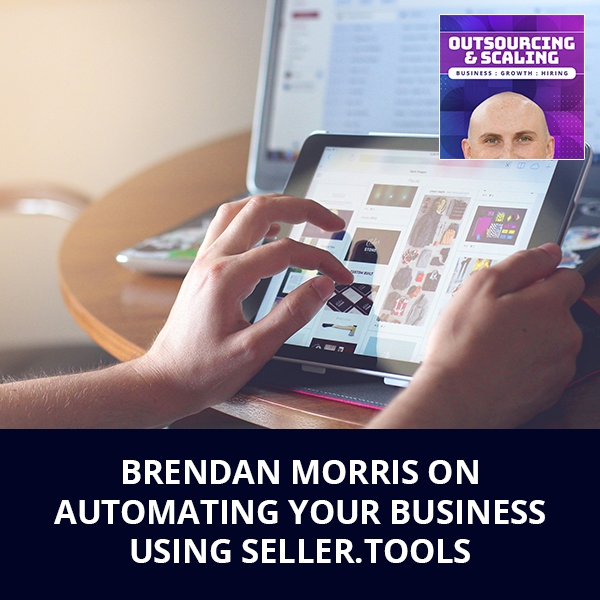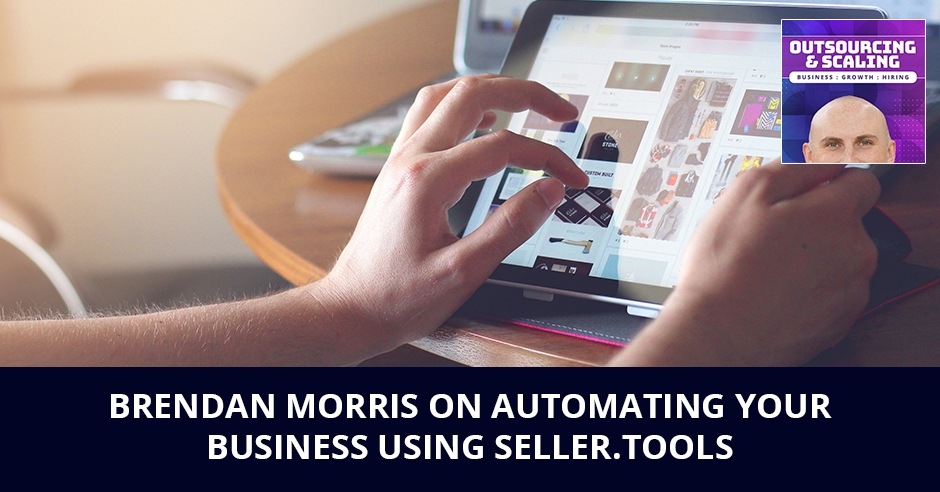


—
Listen to the podcast here:
[smart_track_player url=”https://www.podetize.com/statsapi/www.podetize.com/wp-content/uploads/fileuploads/11-5b145ef137b51b3d1af0633e9305c43d/06/2019/ac668a6bcb5c7458adabc99c08f2b15e.mp3″ title=”Brendan Morris on Automating Your Business Using Seller.Tools” artist=”Nathan Hirsch” image=”https://freeup.net/wp-content/uploads/2019/04/OAS.png” ]
Download the audio file here.
Brendan Morris on Automating Your Business Using Seller.Tools
I have a very special guest, Brendan Morris. Brendan, how are you doing?
I’m good.
Brendan is an Amazon private-label expert. In just three years, he went from working a 9 to 5 job to selling his Amazon business for eight-figure exit and continues his brand empire with the hope of one day for a nine-figure exit. He is utilizing his intimate knowledge of Amazon listing optimization, ranking and automation as Cofounder for the leading Amazon software, Seller.Tools, with a focus on helping private label sellers be successful. It’s quite an impressive resume. I want to talk a little bit about selling Amazon and all of that. First, take us back before Amazon, before the 9 to 5. What kind of a kid were you growing up? Were you a straight-A student? Were you a rebel? Did you know you wanted to be an entrepreneur?
I knew I wanted to be an entrepreneur. I first started off cutting lawns at $5 a lawn. $5 for the front, $5 for the back. I did push my lawnmower down the street making some money over the summer. It was always something in my blood. It was always with something I wanted to do.
Did you go to high school? Did you go to college?
I went to high school, DC student. It didn’t excite me. I finally went to college, which is a community college. I was completely bored. I started getting distracted by video games and I got kicked out of college three times. I had to write a letter to the dean to get accepted back in. He let me back in and I stayed for maybe two months and that was it. I’m definitely a college drop out.
What was your 9 to 5 job? How come you went that route instead of just becoming an entrepreneur right away?
I first started off in retail. I was a grocery guy working in a retail store, stocking shelves. My passion was always computers. I went into the IT world, spent five years as an IT project manager and I kept asking for a raise. I was only getting $20 an hour. I said, “I want a raise.” It was $20 an hour for five years. They asked me, “How much do you want?” I said, “I want a 100% raise. I want to go from $20 to $40 an hour.” They said, “We’ll see what we can do.” A year goes by, they finally came back and said, “We got you a raise.” “This is going to be good. I’m going to go from $40,000 a year to $80,000 a year. This is my dream.” They came back with me with $5. Right then and there I was like, “I need something else.” That’s when I started selling the candy portion of Amazon.
How’d you come across Amazon originally and what was Amazon like back then?
Once you learn what lever you have to pull, you just keep pulling it. Don’t distract yourself with everything else.
That was October of 2013. My parents made peanut brittle every year for Christmas and that’s a candy confection. Everyone raves how good it is. I was like, “Maybe I should throw it up online on Amazon and see what happens.” There’s one photo, it was like $25 for this peanut brittle and instantly sold. I had to go into the kitchen and start making the peanut brittle. We did about 300 units that Christmas, all made by hand in the kitchen, my girlfriend and I. That was the end of December 2013. Starting January, I said, “No more something heavy, something that breaks, something that expires.” You don’t want to do that anymore. That’s when I got into supplements that January of 2014.
How’d you even get started? Do you take a course or was it trial and error?
It was no course, trial and error in the beginning. 2014, I started selling supplements. I was in the testosterone space and then Ryan Moran messaged me out of the blue and said, “I’m a competitor of yours, your competitor in mind. Can we keep the space clean?” We started talking and then he asked me if I was an ASM-er. I said, “What is ASM?” I immediately went out and bought it. I pirated ASM 2 and then I bought ASM 3 because something was missing. What was missing was the people. I got the knowledge from the pirate, but I definitely wanted to pay for it and meet the people.
You got this business off the ground, you’re in supplements, you meet Ryan, you take ASM. I’m assuming you weren’t solo at that point. Were you hiring people? Who was your first hire?
It was just me. Once you learn what lever you have to pull, you keep pulling it. It’s like this is what is working. Don’t distract yourself with everything else like social media. At the time, it was offsite traffic. You didn’t need it at the time. I kept pulling that lever and it wasn’t until 2015 that I had my first hire. It was a full year. Generally, I started selling supplements September of 2014. I quit my day job and in 2015, I had my first hire.
What was the hire for? Who was it? What did he do?
It was a girl and she was more of an IT project manager. She came from the MLM space. I always say she was a wantrepreneur. She was a great hire. It was an all arounder replacement of me, customer service, inbound inventory, all that good stuff that lets you focus on other things.
Did you scale a bigger team or did you keep it small like that, just you and her?
No. Of all the brands I have, even the ones doing $1 million a month or even more than that or even less than that too honestly, it’s just one person per brand and everything is automated. Even responding to seller feedback to inbound inventory. I don’t even create shipping labels. Ranking, reviews, everything’s automated. That’s where 2019 is going.

You have this eight-figure exit. Bridge that gap a little bit. Was it straight up to selling it a success, were there errors along the way and any big mistakes that stood out?
Honestly, the reason I sold was depression and anxiety. I was so stressed. During that time, Amazon went through a huge review wipe in 2015. I went from 70 reviews to zero. I remember waking up at night like, “This sucks.” I quit my job. I don’t know what I wanted to do. I just got over my depression in a couple of days and went back into it, but it was another review wipe. The PQ team came out and they were shutting down on one of my ASMs two or three a week, consistently getting shut down. I knew Amazon, there was going to be a big review wipe and it actually happened. I wanted to leave because I thought this gravy train was going to end. I sold and closed on a Friday and then on Saturday, Amazon did the review wipe after I closed. It was the perfect timing.
Walk us through that process of selling a business. I never sold a business before. I’m sure our audience either haven’t or maybe they have, but they want to at some point. That’s the ultimate goal. What was that process like? How long did it take? Give the audience a peek on the inside?
A long process and a lot of due diligence. The due diligence isn’t difficult because if you know everything about your business, it’s more like putting the pieces together. I use Dropbox and it was consistently putting documents in there. At one point, they literally wanted a screenshot of every single review. It was January of 2016, I called up my tax guy and I said, “I think I want to sell. What do I have to do?” He said, “Get out of California,” because it’s 13.3% income tax just in California. That very next weekend, my wife and I moved across the border to Nevada and we immediately established residency, which is very easy to do. It’s more like a checklist.
Get rid of your home in California, get rid of your dentists, get rid of your library card, then open those up in Nevada. As soon as that happens, you could do it in a weekend. I think it was February the time I moved and we closed in October. It was a long process and it was always consistently delayed because they didn’t know much about Amazon in terms of the optimization. The listings went to FDA compliance and then they notice some wording that they didn’t like so we had to remove that. We had to wait for rankings to shift, move or change but finally, the day came and the big fat wire came in and it was a good feeling.
Jason Swenk, who sold his agency, he actually talked about after he sold that, he almost went into depression because he didn’t know what to do. You miss the people that were in the business. Obviously, you didn’t have as many people, but he had a whole team. Talk to us about that after effect and what you went through to figure out what you wanted to do next.
People often ask me like, “How did you get rid of your baby?” I never viewed it as my baby. I’m not big into supplements. To me, most people that are successful don’t care about what they sell. It seems to be we’re internet marketers that happen to sell this. Internet marketers that happen to sell supplements, cookies or whatever you’re selling. When you take that approach, you take the emotion out of it. I didn’t care about that part of the business. What I definitely cared about was it’s more of your identity because it’s the people, the flights, the conventions. It’s those biweekly paychecks for $300,000, $400,000 in your bank account. When that all vanishes, it’s a shock. To be honest, I went through therapy. I had to get through it. I came out the other side with a brand-new goal and intentions. It’s not easy, put it that way.
What was next? Did you start Seller.Tools? How many years after?
I started Seller.Tools in August of 2014 for myself. I’m huge on automation. Everything is automated. Keyword rankings, BSRs, Best Seller badges, title changes, category changes, seller feedback, review generation, inbound inventory, crate shipment, crate labels, pallet labels, it’s all automated. I created Seller.Tools for that purpose of automating my business because I could rely on software over people.
Your asset is the way you think. It’s the way that you want to build your business.
When did you open that out to the public, were you already doing that before you sold it?
That in itself was huge. I started it with a Pakistan team in 2014. It wasn’t going the direction I want it to so I started with a Filipino team after that and that failed. I went to the American team. I said, “I’m going to get the Michael Jordan.” He alone was going to run the team. He was $300,000 a year. I was like, “I want the best of the best.” I was in the US, completely failed, so I got this team that’s over in Europe. It took four teams and major issues. We went public for different times, but this iteration was about a year and a half.
Talk to me about working with developers. I’ve worked with developers, I fired a ton of developers. Do you code or no?
I’m more like a script kiddie. I could see it, edit it, use it, but that’s it.
I don’t code it all. It was a huge learning curve hiring my first developer. We built our own software for our Amazon business and it was okay. It’s definitely not something we’d go to market. With FreeeUp, all the backend is all built by our developers and we went through a bunch of them too before we figured out that right team. What did you learn from dealing with developers and what advice would you give to people out there that are hiring developers for the first time?
Completely think out your idea to the fact that you have documentation, whiteboarding, water framing because the dev things in code are not visual. They’re probably the worst in terms of design or artistry. It will always take you four times as long and four times as much cash. If someone coaches you on $5,000 for the project, it’s going to be $20,000. Maybe they coach you in one month, it’s going to be four months. Completely be patient, have enough cash, explain your ideas as well as you can so even a second grader could understand because the person thinks differently.
What about your take on sprints and bugs? Do you have a certain process that you go through it and have it repetitive or does it depend on what you’re trying to add and does that change over time?
It definitely changes over time. We use Jira. I’m lucky that my business partner in that is not only an Amazon seller, but also is the manager of the entire project. He knows coding and project management. He knows all the sprints and the milestones. He lays it all out for the team and it’s consistently changing. We will develop an idea or a feature that we want to roll out and all of a sudden, checking reviews or search volume is no longer there, and then we have to completely change and fix things and so it’s consistently being delayed.
I’ve had that same experience and I gave it to my business partner, Connor, who has a slightly different complement to my skills and he handles the developers much better than I do. Let’s talk about having a business partner. Have you had any bad experience with business partners? How do you find your business partner now and how do you have that great relationship? You always hear these horror stories of business partners splitting up. How do you keep it civil and keep that good relationship going forward?

Business partners, they need to be the opposite of you. I think it can happen, but what I’ve noticed is that if you go find another ASMer, and you guys are like, ”I’m an ASMer, you’re an ASMer, let’s do this together,” it can work, but you guys definitely don’t complement each other. One of my best business partners, he’s the complete opposite of me. He’s detail-oriented, he’s analytic, he’s awesome. He was my ex-boss at my last job. I knew that fit was right then and there. You need to find someone with the opposite skill set because if you guys complement each other, then you guys are going to be one-sided and weigh to one side. You need people that think completely different than you. Even Troy with Seller.Tools. He thinks completely opposite the way I do. He has a different perspective, a different conversation, even the language he uses. I like to speak in bullet points and he likes to speak in corporate doc.
Let’s say someone is out there and they built the business, they’ve got it to $1 million or $2 million and they want to get it to $10 million, eight-figures. What advice do you have that might be different from that startup to get from zero to one, to get from one to ten?
It’s to replace yourself. Your asset is the way you think. It’s the way that you want to build your business. It’s a new perspective. People don’t think like an entrepreneur, especially a successful entrepreneur. You have to replace yourself in terms of the daily tasks whether that’s using something like FreeUp in order to get someone to do the customer service or the inventory control or whatever it may be. For me, I like automation. I like the computer doing the work for me, but either way, you need to take yourself out of the business. If you’re finding yourself clicking a lot, then you need to stop clicking.
We appreciate you coming on and this was some great insight from someone who’s been there and sold the big business. Where can people find out more about you? What do you have exciting coming up that you want people to know about?
The thing that I share the most because I’m pretty private with my brands is Seller.Tools. We built the software for Amazon sellers. A lot of the things that I develop in Seller.Tools are stuffs that I want. We just released the API, which means you could literally do anything you want with your Amazon data. Let me walk you through a couple of scenarios. It could be something as simple as let’s say your keyword ranking drops from one to five. You can immediately trigger ManyChat broadcast to twenty people and immediately get sales on that particular keyword before you even wake up. Maybe it’s a Best Seller badge.
If you drop and lose your Best Seller badge, completely automate that and get yourself back up to the top or it’s a customer service where they have a conversation with themselves. They troubleshoot themselves, send themselves an NCF order by themselves. It’s about that automation. Either the computer does it, a VA does it, or the customer does their own work for them. Automation is definitely helping me scale. If you guys do want to find me, I’m always in Seller.Tools. We have a Facebook group called FBA Kings. If you want to shoot me an email direct, it’s Brendan@Seller.Tools.
Thanks so much.
Thank you.
Important Links:
- Seller.Tools
- Jira
- FBA Kings – Facebook Group
- Brendan@Seller.Tools
About Brendan Morris
 Brendan Morris is an Amazon private-label expert. In just 3 years he went from working a 9-to-5 job to selling his Amazon business for an 8-figure exit and continues his brand empire with the hope one day for a 9-figure exit.
Brendan Morris is an Amazon private-label expert. In just 3 years he went from working a 9-to-5 job to selling his Amazon business for an 8-figure exit and continues his brand empire with the hope one day for a 9-figure exit.
Utilizing his intimate knowledge of Amazon listing optimization, ranking, and automation as Co-founder for the leading Amazon software Seller.Tools focused on helping private label seller be successful.
